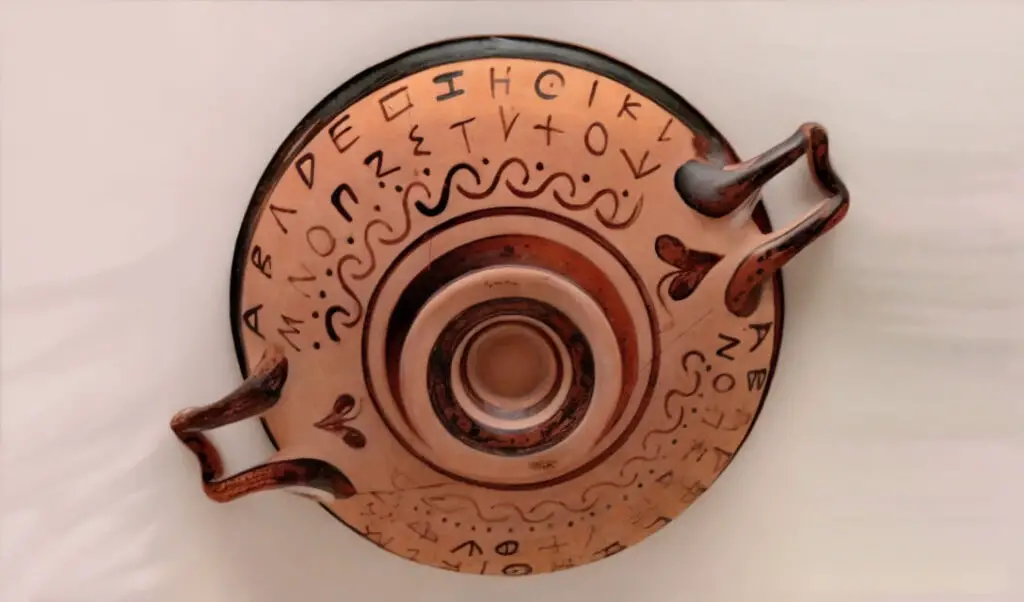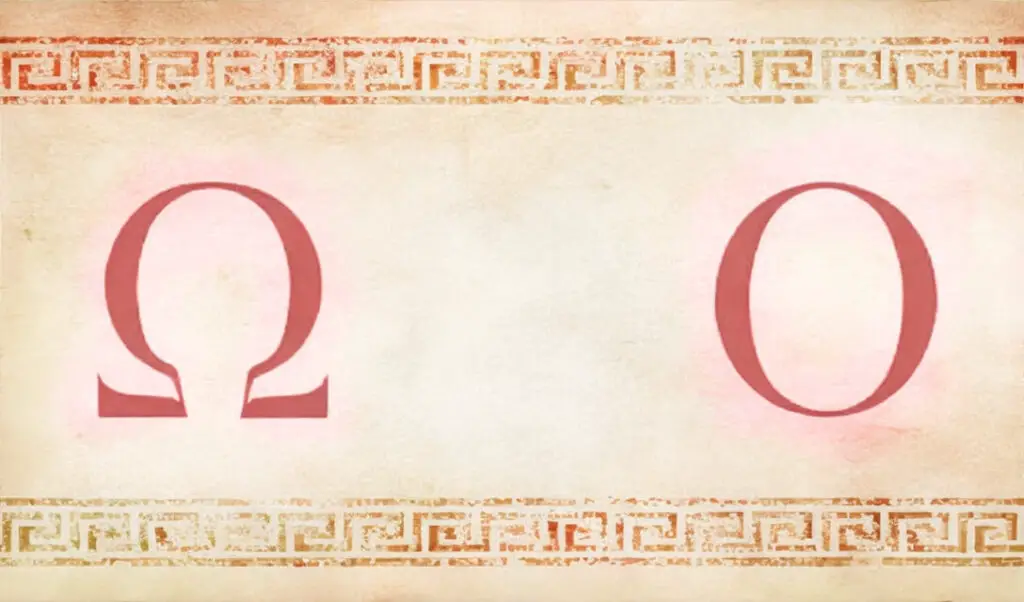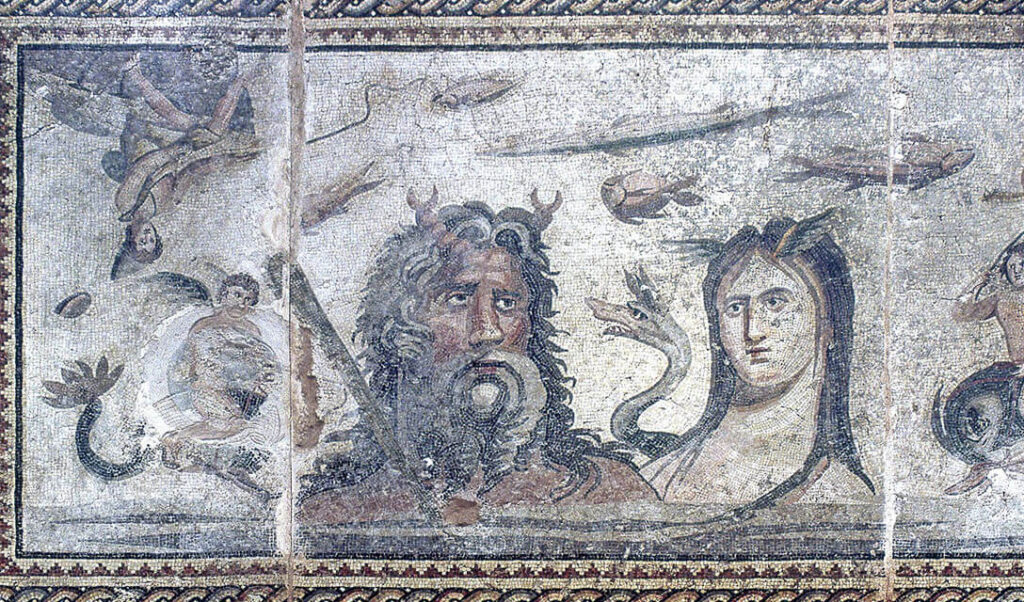O in Greek, a symbol of simplicity, fluidity, and balance. This character has graced countless pages of literature, scientific manuscripts, religious texts, and more. Yet, its simplicity hides a complex history, one intertwined with the growth and expansion of Greek civilization itself. The humble ‘O’ in Greek represents not just a sound, but also embodies rich cultural, spiritual, and scientific significance. Its tale is a narrative worth exploring, one that takes us from the birth of the Greek alphabet to the realms of modern scientific notation and beyond.
The Greek Letter O: An Overview

To comprehend the essence of the Greek letter O, it’s crucial to understand that it isn’t a singular entity. It is represented by two distinct forms: the Omicron (ο) and the Omega (ω). Both letters look similar to the untrained eye but hold very different places in the Greek alphabet and language.
Omicron (ο), derived from the phrase “ο μικρόν”, meaning “small o,” is the 15th letter of the Greek alphabet. In contrast, Omega (ω), stemming from “ω μέγα”, meaning “large o,” concludes the Greek alphabet as its 24th and final letter. Aesthetically, both letters embody the graceful curvature we associate with the letter ‘O,’ but their usage and connotation differ significantly.
Omicron (ο) and Omega (ω) are both vowels, with Omicron indicating a short ‘o’ sound, akin to ‘hot,’ and Omega representing a long ‘o’ sound, as in ‘low.’ The divergence in pronunciation, while subtle to the untrained ear, plays a crucial role in the melody and rhythm of spoken Greek.
Understanding the dichotomy of Omicron vs. Omega offers insight into the richness of the Greek language. It not only exemplifies the meticulous detail embedded within Greek phonetics but also underlines how a single letter can possess multiple identities, each carrying its own weight and significance within the broader context of the Greek language.
The History and Evolution of the Greek Letter O

The evolution of the Greek letter O is a testament to the dynamic nature of languages and scripts. The origins of the letter O trace back to the Phoenician alphabet, where it was represented by the letter Ayin. Unlike its Greek and English successors, Ayin was a consonant with no associated vowel sound. When the Greeks adopted the Phoenician alphabet, they transformed Ayin into the vowel O, with two variations: Omicron and Omega.
This transformation from Ayin to O in Greek symbolizes a significant linguistic transition: the creation of an entirely new category of sounds within the language. This shift highlights the innovative spirit of the Greek civilization and their commitment to perfecting the tools of their expression.
As the Greek civilization flourished, so did its alphabet. The spread of Hellenistic culture across the ancient world brought Greek scripts into new regions, influencing various writing systems in the process. The letter O, in its Omicron and Omega forms, traveled far and wide, eventually finding its way into the Latin alphabet and subsequently into English and other languages that employ this script.
Writing and Pronouncing the Greek Letter O

Mastering the art of writing the Greek letters Omicron and Omega is a doorway into the rich linguistic tapestry of the Greek language. It starts with understanding the nuances between them.
To write Omicron, begin by drawing a simple circle, much like the English ‘O’. On the other hand, Omega is more complex. Begin by drawing a semicircle. Then draw two vertical lines downward from the ends of the semicircle. Finally, connect the two vertical lines at the bottom with a curved line, creating a shape resembling a horseshoe or a ‘w’ with rounded edges.
While the process of writing these letters is relatively straightforward, correctly pronouncing them can be slightly more challenging for non-native speakers. As mentioned earlier, Omicron (ο) signifies a short ‘o’ sound, similar to ‘hot,’ while Omega (ω) represents a long ‘o’ sound, akin to ‘low.’ Although subtle, these pronunciation differences are significant and can change the meaning of words in the Greek language. So, how do you pronounce Omicron and Omega? Remember the simple guide: short for Omicron and long for Omega, which is the last and longest journey in the Greek alphabet.
The Greek Letter O in Mathematics and Statistics

The Greek alphabet doesn’t confine itself to linguistic landscapes; it finds widespread usage in the field of Mathematics and Statistics as well. The Greek letter Omega and Omicron are no exceptions.
Omega (ω) is a frequent visitor in mathematical texts, where it has multiple representations depending on the context. In calculus, Omega denotes a differential form, while in set theory, it represents the first transfinite ordinal number. It also symbolizes the ohm in physics, the SI unit for electrical resistance. In computer science, Omega is used to denote the worst-case or asymptotic lower bound of an algorithm. Clearly, Omega has made a significant impact in these fields with its various usages, making the Greek O in math an essential symbol for the scientific community.
Omicron (ο), on the other hand, does not enjoy the same popularity in Mathematics or Statistics as Omega. Its usage is quite limited, with one of its notable appearances being in Number Theory as a function symbol.
The Spiritual and Symbolic Significance of Omega

The Greek letter Omega holds profound spiritual and symbolic significance, especially in the Christian faith, where it has a special place due to a particular verse in the Book of Revelation in the Bible. In this verse, God refers to himself as the “Alpha and Omega,” symbolizing the beginning and the end, the first and the last.
This statement equates God with eternity, portraying him as the beginning of all things (Alpha) and the culmination of everything (Omega). As a result, Omega has become an emblem of God’s eternal nature in Christian iconography, signifying the concept of everlasting life in the faith. The Spiritual Meaning of the Letter O becomes apparent through this association with God’s infinite presence and the promise of eternal salvation.
Furthermore, beyond its religious context, the Omega symbol also embodies completion, perfection, and the ultimate truth. It serves as a powerful representation of the journey of existence, from the Alpha, signifying the beginning, to the Omega, representing the end. This spiritual symbolism offers a profound sense of closure and wholeness, encompassing the entirety of life’s experiences and emphasizing the interconnectedness of all things.
Thus, the letter O, particularly in its Omega form, holds a dual significance as a symbol of both divine eternity and the profound truths of existence. It is a testament to the vast spiritual and symbolic depth that can be found even within a single letter.
Exploring the Greek Alphabet: The Role of Omicron and Omega

In the realm of the Greek alphabet, Omicron and Omega are significant players that hold vital roles. They have influenced the shape of Greek language and culture, adding depth and richness to its linguistic landscape.
The Greek alphabet, unlike the English one, has two distinct “O” letters – Omicron (ο) and Omega (ω). Both these letters have their unique places and influence within the alphabet. Omicron is the 15th letter of the Greek alphabet, while Omega is the final, the 24th letter. Their different positions in the alphabet’s sequence signify their distinctive roles in the language.
Omicron and Omega are more than just letters within the Greek alphabet; they contribute to the formation and meaning of many Greek words. Their usage is not random but determined by linguistic rules and phonetic considerations, leading to an intricate interplay of sounds and meanings in Greek linguistics.
While Omicron and Omega might appear similar to the untrained eye, their distinctness becomes evident upon closer inspection. They possess different shapes, sounds, and connotations, enriching the Greek language with their unique characteristics. The Greek alphabet’s dynamism, to a large extent, can be attributed to these subtle variations within its letters, making the study of Omicron and Omega an exciting venture into the world of Greek linguistics.
Greek Names, Last Names, and Gods That Start With O

Greek culture is filled with vibrant mythology, historical figures, and family histories that are reflected in Greek names and surnames. The Greek letters Omicron and Omega are at the forefront of this linguistic panorama, contributing to many names that begin with the letter “O”.
Greek Names That Start With O
When we look at Greek names that start with O, we stumble upon beautiful names like Olympia, a name that carries the glory of Mount Olympus, the residence of the Greek gods. Then there’s Orestes, a mythological figure who avenged his father’s death in Greek mythology. Names like Octavia and Odessa also hold roots in Greek culture.
- Olympia – A feminine name associated with Mount Olympus and the Olympic Games.
- Orestes – A masculine name derived from Greek mythology, known for its tragic hero.
- Octavia – A feminine name with Roman origins, meaning “eighth.”
- Odessa – A feminine name derived from the Greek city of Odessa, associated with the sea.
- Ophelia – A feminine name with Shakespearean origins, famously used in “Hamlet.”
- Orion – A masculine name derived from Greek mythology, representing a hunter.
- Orpheus – A masculine name associated with the legendary musician, poet, and prophet.
- Othon – A masculine name with Greek and Germanic origins, meaning “wealthy.”
- Ourania – A feminine name derived from the Greek word for “heavenly” or “celestial.”
Last Names That Start With O
Moving on to surnames, it’s common to find Greek last names that start with O, such as Onassis, made famous by the shipping magnate Aristotle Onassis, or Orfanos, a surname meaning ‘orphan’. Other common surnames include Oikonomou (meaning ‘economist’) and Orfeus (a name of a legendary musician in Greek mythology).
- Onassis – A famous Greek surname associated with the influential Onassis family.
- Orfanos – A Greek surname derived from the word “orphan.”
- Oikonomou – A common Greek surname meaning “economist” or “household manager.”
- Orfeus – A surname derived from the mythical figure of Orpheus.
- Othonos – A Greek surname derived from the masculine name “Othon.”
- Ouranis – A surname derived from the Greek word for “heaven” or “sky.”
- Olympios – A surname derived from the word “Olympic” or related to Mount Olympus.
- Oikonomides – A patronymic surname derived from the Greek word “oikonomos” (economist).
- Orfanidis – A patronymic surname derived from the word “orphan.”
Gods That Start With O
In terms of Greek deities, mythology gifts us with gods like Oceanus, the divine personification of the sea, and Olympus, the name given to the home of the gods, reflecting the mythology’s depth and grandeur. The Greek pantheon’s tales are weaved with characters beginning with the letter O, further emphasizing the significance of Omicron and Omega in Greek mythology.
- Oceanus – A primordial god of the sea in Greek mythology.
- Olympus – The home of the gods in Greek mythology, also known as Mount Olympus.
- Orpheus – A legendary musician, poet, and prophet in Greek mythology.
- Ourea – The gods of mountains in Greek mythology.
- Oizys – A goddess representing misery, suffering, and anxiety in Greek mythology.
Mystery of the Greek Symbol O with a Line

An intriguing part of the Greek alphabet is the existence of a unique letter that bears a resemblance to an “O” but is accompanied by a distinct line, adding an element of mystery and curiosity.
The Greek letter Phi (Φ, φ), for instance, could be considered an “O” with a vertical line, even though it does not correspond directly to an “O” in its sound or usage. This letter represents a voiceless labiodental fricative, a sound that is similar to “f” in English. Phi is also widely used in various scientific and mathematical contexts.
Another letter, Theta (Θ, θ), can be seen as an “O” with a horizontal line. In Greek, it stands for a voiceless dental fricative, akin to the “th” sound in English. Beyond its linguistic usage, Theta also has applications in mathematics, physics, and engineering.
These letters might seem like an anomaly or a curiosity to English speakers, but for Greeks, they represent the diversity and depth of their alphabet. The Greek letter o with line is more than a mysterious symbol; it is a testament to the Greek language’s richness, where even similar-looking letters can hold unique sounds and meanings.
Conclusion
The exploration of the letter “O” in Greek is more than a linguistic journey; it is a voyage into the depths of a language that has profoundly shaped human history and thought. The journey from Omicron to Omega, from ancient scripts to modern usage, reveals the rich tapestry of Greek language and culture, a tapestry where each letter plays a unique part.
The Omicron and Omega, despite their differences, both represent the “O” sound in their unique ways, enriching the language with their individual characteristics. They underline the beauty and complexity of the Greek language, where each letter, each sound, carries its weight and contributes to the language’s depth and richness.
By delving into the different dimensions of these letters, from their role in Greek names and gods to their significance in mathematics and statistics, we gain a broader understanding of the Greek language. It’s a language that thrives on diversity, complexity, and history, where each letter is a world in itself, waiting to be discovered.
In this exploration of the letter “O” in Greek, one thing becomes clear: The Greek language, with its intricate alphabet and rich history, continues to captivate and intrigue us, sparking our curiosity and inviting us to delve deeper into its mysteries. The Spiritual Meaning of the Letter O intertwines with the linguistic exploration, reminding us of the significance that letters hold beyond their phonetic value.
This journey, as we have seen, is full of unexpected turns and fascinating revelations, leaving us with an even greater appreciation for this beautiful language and its enduring legacy. As we reflect on the significance of the letter “O” in Greek, we are reminded of the power of language to shape our understanding of the world and our place within it.
And so, we conclude our exploration of the Greek letter “O”, a journey that has taken us from the ancient scripts of Greece to its modern usage. We hope this journey has been as fascinating and enlightening for you as it has been for us, leaving you with a deeper understanding of the Greek language and its beautiful complexity. Whether it’s in the name of a Greek god, the formula of a mathematical equation, or a line in a Greek poem, the Greek “O” lives on, continuing to shape and enrich the world of language. Embrace the letter “O” in all its linguistic and spiritual significance, and let it inspire your own exploration of language and culture. As you continue your linguistic journey, remember to uncover the spiritual meaning of the letter O in Spanish and the profound connections it may hold within the Spanish-speaking world.




